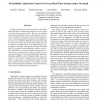Free Online Productivity Tools
i2Speak
i2Symbol
i2OCR
iTex2Img
iWeb2Print
iWeb2Shot
i2Type
iPdf2Split
iPdf2Merge
i2Bopomofo
i2Arabic
i2Style
i2Image
i2PDF
iLatex2Rtf
Sci2ools
106
click to vote
ECRTS
2007
IEEE
2007
IEEE
Probabilistic Admission Control to Govern Real-Time Systems under Overload
Existing real-time research focuses on how to formulate, model and enforce timeliness guarantees for task sets whose correctness has a temporal aspect. However, the resulting systems often exhibit poor resource utilization due to the resource scheduler reserving more resources than required in order to ensure that admitted schedules can be satisfied under worst case conditions. Weakening the guarantees leads to the known concepts of firm and soft real-time tasks, but we think the paradigm needs to be shifted further, reifying efficient utilization. With Quality-Assuring Scheduling (QAS) we presented such an algorithm. However, its practical applicability is restricted to uniform and harmonic periods, due to its complexity for arbitrary periods. To overcome this limitation, we introduce Quality-Rate-Monotonic Scheduling (QRMS), which, although slightly more pessimistic, is less complex compared to QAS. The admission control is again based on a probabilistic model to ensure that a re...
Related Content
| Added | 02 Jun 2010 |
| Updated | 02 Jun 2010 |
| Type | Conference |
| Year | 2007 |
| Where | ECRTS |
| Authors | Claude-Joachim Hamann, Michael Roitzsch, Lars Reuther, Jean Wolter, Hermann Härtig |
Comments (0)

